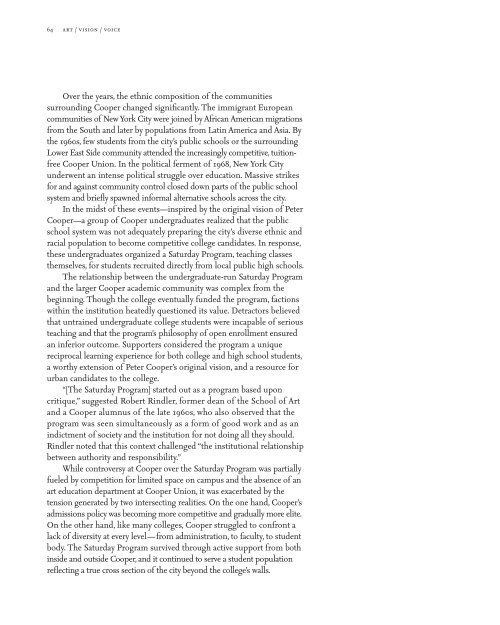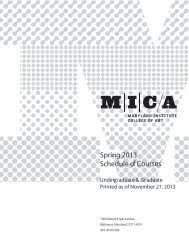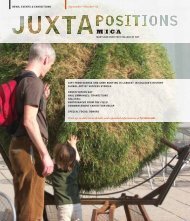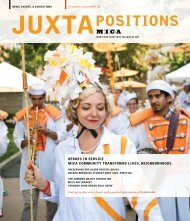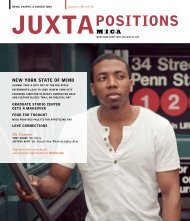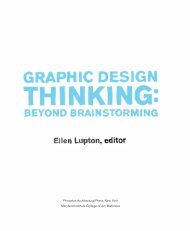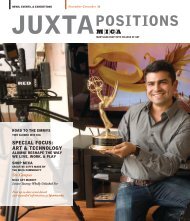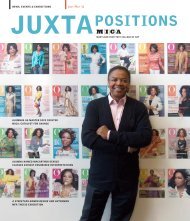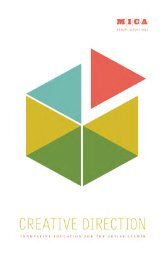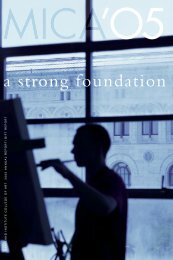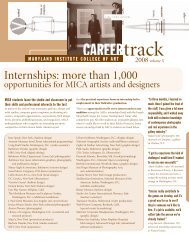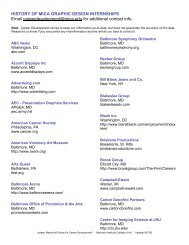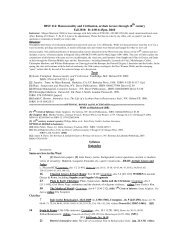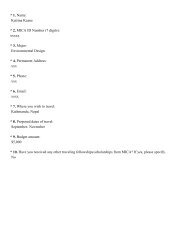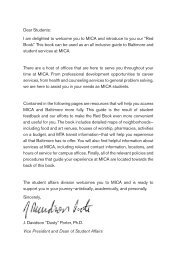art/vision/voice - Maryland Institute College of Art
art/vision/voice - Maryland Institute College of Art
art/vision/voice - Maryland Institute College of Art
You also want an ePaper? Increase the reach of your titles
YUMPU automatically turns print PDFs into web optimized ePapers that Google loves.
64 <strong>art</strong> / <strong>vision</strong> / <strong>voice</strong><br />
Over the years, the ethnic composition <strong>of</strong> the communities<br />
surrounding Cooper changed significantly. The immigrant European<br />
communities <strong>of</strong> New York City were joined by African American migrations<br />
from the South and later by populations from Latin America and Asia. By<br />
the 1960s, few students from the city’s public schools or the surrounding<br />
Lower East Side community attended the increasingly competitive, tuitionfree<br />
Cooper Union. In the political ferment <strong>of</strong> 1968, New York City<br />
underwent an intense political struggle over education. Massive strikes<br />
for and against community control closed down p<strong>art</strong>s <strong>of</strong> the public school<br />
system and briefly spawned informal alternative schools across the city.<br />
In the midst <strong>of</strong> these events—inspired by the original <strong>vision</strong> <strong>of</strong> Peter<br />
Cooper—a group <strong>of</strong> Cooper undergraduates realized that the public<br />
school system was not adequately preparing the city’s diverse ethnic and<br />
racial population to become competitive college candidates. In response,<br />
these undergraduates organized a Saturday Program, teaching classes<br />
themselves, for students recruited directly from local public high schools.<br />
The relationship between the undergraduate-run Saturday Program<br />
and the larger Cooper academic community was complex from the<br />
beginning. Though the college eventually funded the program, factions<br />
within the institution heatedly questioned its value. Detractors believed<br />
that untrained undergraduate college students were incapable <strong>of</strong> serious<br />
teaching and that the program’s philosophy <strong>of</strong> open enrollment ensured<br />
an inferior outcome. Supporters considered the program a unique<br />
reciprocal learning experience for both college and high school students,<br />
a worthy extension <strong>of</strong> Peter Cooper’s original <strong>vision</strong>, and a resource for<br />
urban candidates to the college.<br />
“[The Saturday Program] st<strong>art</strong>ed out as a program based upon<br />
critique,” suggested Robert Rindler, former dean <strong>of</strong> the School <strong>of</strong> <strong>Art</strong><br />
and a Cooper alumnus <strong>of</strong> the late 1960s, who also observed that the<br />
program was seen simultaneously as a form <strong>of</strong> good work and as an<br />
indictment <strong>of</strong> society and the institution for not doing all they should.<br />
Rindler noted that this context challenged “the institutional relationship<br />
between authority and responsibility.”<br />
While controversy at Cooper over the Saturday Program was p<strong>art</strong>ially<br />
fueled by competition for limited space on campus and the absence <strong>of</strong> an<br />
<strong>art</strong> education dep<strong>art</strong>ment at Cooper Union, it was exacerbated by the<br />
tension generated by two intersecting realities. On the one hand, Cooper’s<br />
admissions policy was becoming more competitive and gradually more elite.<br />
On the other hand, like many colleges, Cooper struggled to confront a<br />
lack <strong>of</strong> diversity at every level—from administration, to faculty, to student<br />
body. The Saturday Program survived through active support from both<br />
inside and outside Cooper, and it continued to serve a student population<br />
reflecting a true cross section <strong>of</strong> the city beyond the college’s walls.


